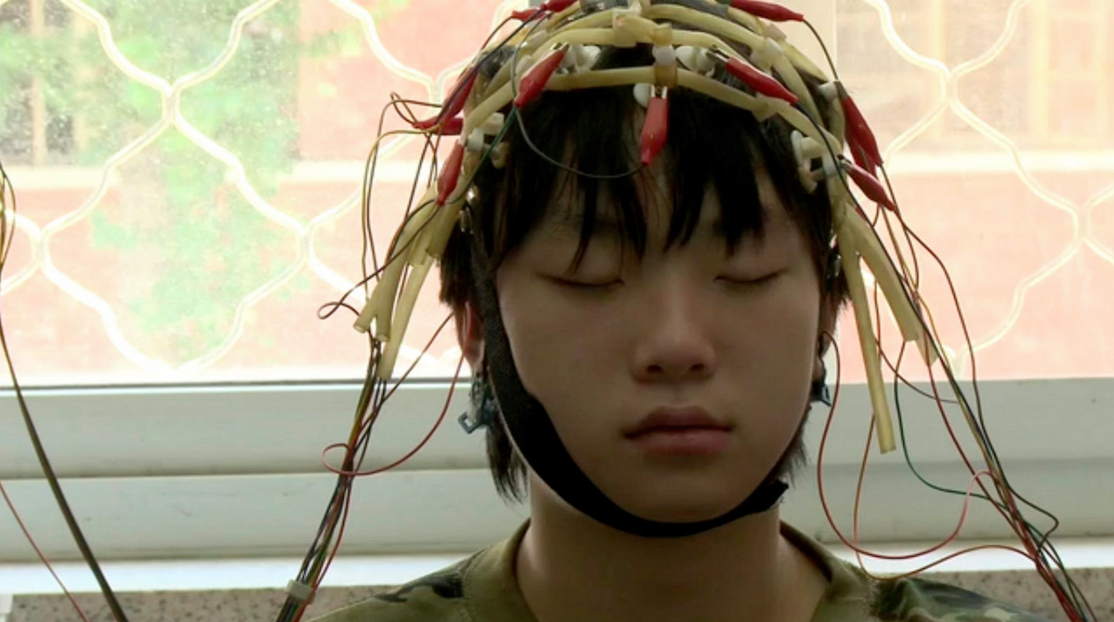 Back to selection
Back to selection
“Do We Need to Be Cured of It?” Considering Web Junkie

Web Junkie, Shosh Shlam and Hilla Medalia’s startling documentary about internet addiction in China opens today at New York’s Film Forum. At Sundance, where it premiered, it was considered by Brandon Harris, and Danielle Lurie interviewed the directors.
Wrote Harris, in a piece that also included discussion of the doc Love Child:
In Web Junkie, teenage boys, often having been deceived into going or plainly drugged and captured with their parents’ approval, suffer a military bootcamp-style existence complete with isolation chambers and other forms of moderately cruel discipline, interspersed with moments of counseling from sensitive, largely female psychologists and a tough love institutional leader who likens what the boys are suffering from to heroin addiction. So many of us in the West are familiar with the fear that the information superhighway consumes too much of our lives, distorts our sexual preferences/imagination/being, makes us professional enviers, causes us to share opinions and feelings that are nobody’s business, lets us know what near strangers are doing all the time. But do we need to be, well, cured of it? Has it someone corroded, or added to, our humanity? Clear answers remain opaque; the internet, after all, is still a very new development in human history.
What is specifically going on in Asia, however? If these two docs are to be believed, Chinese and Korean, young and old, male or female, it doesn’t matter; so many, perhaps too many, seem to be utterly consumed with electronic games. Are Beijing and Seoul such polluted and dreary places that its citizens don’t want to play soccer somewhere? Not everyone can have clouds to reach up and touch like the Himalayan children in Happiness, but still. While acknowledging various Asian governments’ approaches to mitigating the effects of “internet addiction” (boot camps for boys in Beijing, the Juvenile Protection Act in South Korea, which makes online gaming unavailable to those under 16 between the times of 12am and 6am) neither movie stops to ask why? The gamers in both films aren’t reflective enough in the time the filmmakers spend amongst them alone to ever reveal motivations beyond that the games are engrossing.
Regardless, gamers in both films confess to playing endlessly, amounts that would have driven myself — at one time a 10-to-12 hours-a-day-on-the-weekends gamer – a bit crazy. Some of the Chinese teenagers in Web Junkie claim to have played for as much as 300 hours consecutively, and to have stopped eating or going to the bathroom for fear that it would affect their abilities. One of the key characters, 16-year-old Nicky, lied to his parents about going to friends’ homes when he’s really gone out to internet cafes for an all-night bender. He’s a seemingly reasonable kid, except when he’s angry; Nicky engages with some of the most searing adolescent confrontations I’ve ever seen between parent and child in a cinema. At one point, in the middle of a counseling session, he tells his father point blank, “If you want me to die, I will do so right now.” Another time he pleads with them to allow him to come home from the camp (the minimum stay is three months). “Tomorrow, hold my ashes and cry,” he tells them as he hang up. That he then asks his counselor, after a moment of silence, for permission to smash the window next to her seems beside the point, but it’s a glimmer of anger and existential malaise in the New China rarely seen in contemporary filmmaking.
In an interview, Shlam tells Lurie, “Technology has become the architect of our intimacy. We are increasingly connected to each other but oddly more alone. In intimacy, we have found a new solitude.” Meanwhile, producer Neta Zwebner-Zaibert explains her personal reasons for becoming involved:
Also, as a young mother, I spend a lot of time thinking about my daughter’s future and how the Internet will impact her life; Facebook, posting everything online, losing her private childhood, what her friendships will look like, and other concerns. Especially, what will my role be in this? How can I set boundaries so that she can enjoy the amazing positive effects the internet can have as well? If my three-year-old can easily enter my iPad password and watch anything she wants on YouTube… If this is the world we live in, what should the boundaries be and how do we enforce them?
I really feel for the mothers of the children in the film. Understanding the desire to do anything in your power to protect your children and ensure their personal and emotional safety, even by sending them to these kinds of centers to cure them from their Internet addiction while locking their kids behind bars, using very harsh discipline, medication, and more. It might be obvious that these kids are addicted but is this the right way to treat and combat the issue?
Coming on board for this project I felt that we have a responsibility to share the unbelievable access we got with the world and bring awareness to this issue.
